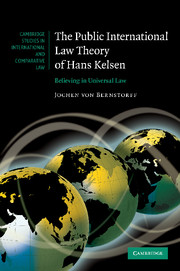Book contents
- Frontmatter
- Contents
- Preface
- Introduction
- PART I The quest for objectivity: the method and construction of universal law
- PART II The outlines of the cosmopolitan project – the actors, sources, and courts of universal law
- 4 The new actors of universal law
- 5 Legal sources as universal instruments of law-creation
- 6 The international judiciary as the functional center of universal law
- 7 The role of the international legal scholar after Kelsen – a concluding reflection
- Postscript – on Kelsenian formalism in international law (2010)
- Career sketches: Hans Kelsen, Alfred Verdross, and Josef Laurenz Kunz
- Bibliography
- Index
- CAMBRIDGE STUDIES IN INTERNATIONAL AND COMPARATIVE LAW
7 - The role of the international legal scholar after Kelsen – a concluding reflection
Published online by Cambridge University Press: 03 May 2011
- Frontmatter
- Contents
- Preface
- Introduction
- PART I The quest for objectivity: the method and construction of universal law
- PART II The outlines of the cosmopolitan project – the actors, sources, and courts of universal law
- 4 The new actors of universal law
- 5 Legal sources as universal instruments of law-creation
- 6 The international judiciary as the functional center of universal law
- 7 The role of the international legal scholar after Kelsen – a concluding reflection
- Postscript – on Kelsenian formalism in international law (2010)
- Career sketches: Hans Kelsen, Alfred Verdross, and Josef Laurenz Kunz
- Bibliography
- Index
- CAMBRIDGE STUDIES IN INTERNATIONAL AND COMPARATIVE LAW
Summary
Throughout this book Kelsen's approach to international law has been explained as arising from the tension-filled relationship between the two crucial goals of his theories of international law: first, establishing a non-political methodology of legal scholarship, and, second, promoting the cosmopolitan project – born in the interwar period – of a thoroughly juridified and more strongly institutionalized world order. Time and again, I have pointed to the inner connection that Kelsen established between these two originally conflicting goals. That main link was found in the methodologically guided – that is, “purely” scholarly – critique of those doctrinal elements that potentially stood in the way of his own cosmopolitan project. The consequence of this critique was a not inconsiderable limitation on the role and significance of international legal doctrine in areas that were especially sensitive for his politico-legal project. Kelsen was obviously willing to accept that consequence.
In his introduction to the 1950 commentary on the Charter of the United Nations, The Law of the United Nations, Kelsen offered a final statement on his self-conception as an international lawyer. He had to measure his own commentary on the Charter by the role that he accorded the international lawyer in the introduction: “‘Juristic’ in contradistinction to ‘political’ has the connotation of ‘technical.’ It is not superfluous to remind the lawyer that as a ‘jurist’ he is but a technician whose most important task is to assist the law-maker in the adequate formulation of legal norms.”
- Type
- Chapter
- Information
- The Public International Law Theory of Hans KelsenBelieving in Universal Law, pp. 225 - 232Publisher: Cambridge University PressPrint publication year: 2010



